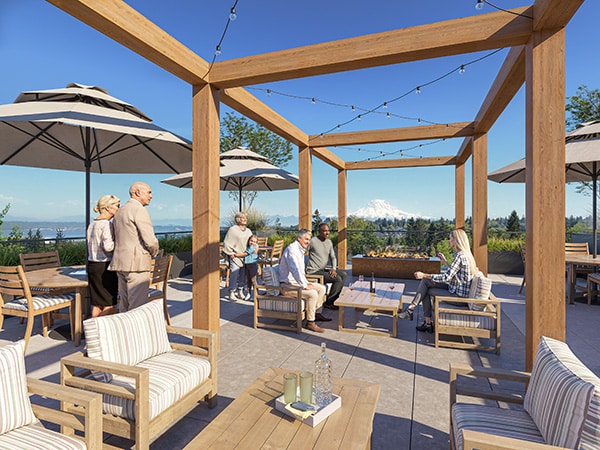Does My Loved One Need Memory Care? Common Signs To Watch For

Are you concerned about memory loss in yourself or a loved one? According to the Alzheimer’s Association, an estimated 6.5 million Americans age 65 or older (about one in nine Americans) are living with Alzheimer’s in 2022. This jumps to 73 percent for ages 75 or older. The number of people with the disease doubles every five years beyond age 65. In fact, every 65 seconds, someone in America develops Alzheimer’s. By mid-century, someone in America will develop the disease every 33 seconds. It is estimated that nearly 500,000 new cases of Alzheimer’s disease will be diagnosed in 2022.
According to the Mayo Clinic, Alzheimer’s disease typically progresses slowly in three general stages: early, middle and late (sometimes referred to as mild, moderate and severe in a medical context). Since Alzheimer’s affects people in different ways, each person may experience symptoms — or progress through the stages — differently.
The following information is provided by the Alzheimer’s Association.
Here are some common signs and symptoms to watch for:
Cognitive changes
- Memory loss, which is usually noticed by someone else
- Difficulty communicating or finding words
- Difficulty with visual and spatial abilities, such as getting lost while driving
- Difficulty reasoning or problem-solving
- Difficulty handling complex tasks
- Difficulty with planning and organizing
- Difficulty with coordination and motor functions
- Confusion and disorientation
Psychological changes
- Personality changes
- Depression
- Anxiety
- Inappropriate behavior
- Paranoia
- Agitation
- Hallucinations
According to the Alzheimer’s Associations, “Changes in the brain related to Alzheimer’s begin years before any signs of the disease. This time period, which can last for years, is referred to as preclinical Alzheimer’s disease. The stages below provide an overall idea of how abilities change once symptoms appear and should only be used as a general guide. (Dementia is a general term to describe the symptoms of mental decline that accompany Alzheimer’s and other brain diseases). Be aware that it may be difficult to place a person with Alzheimer’s in a specific stage as stages may overlap.”
Early-Stage Alzheimer’s (mild)
In the early stage of Alzheimer’s, a person may function independently. He or she may still drive, work and be part of social activities. Despite this, the person may feel as if he or she is having memory lapses, such as forgetting familiar words or the location of everyday objects. Symptoms may not be widely apparent at this stage, but family and close friends may take notice and a doctor would be able to identify symptoms using certain diagnostic tools.
Common difficulties include:
- Coming up with the right word or name.
- Remembering names when introduced to new people.
- Having difficulty performing tasks in social or work settings.
- Forgetting material that was just read.
- Losing or misplacing a valuable object.
- Experiencing increased trouble with planning or organizing.
Middle-Stage Alzheimer’s (moderate)
Middle-stage Alzheimer’s is typically the longest stage and can last for many years. As the disease progresses, the person with Alzheimer’s will require a greater level of care. During the middle stage of Alzheimer’s, the dementia symptoms are more pronounced. the person may confuse words, get frustrated or angry, and act in unexpected ways, such as refusing to bathe. Damage to nerve cells in the brain can also make it difficult for the person to express thoughts and perform routine tasks without assistance.
Symptoms, which vary from person to person, may include:
- Being forgetful of events or personal history.
- Feeling moody or withdrawn, especially in socially or mentally challenging situations.
- Being unable to recall information about themselves like their address or telephone number, and the high school or college they attended.
- Experiencing confusion about where they are or what day it is.
- Requiring help choosing proper clothing for the season or the occasion.
- Having trouble controlling their bladder and bowels.
- Experiencing changes in sleep patterns, such as sleeping during the day and becoming restless at night.
- Showing an increased tendency to wander and become lost.
- Demonstrating personality and behavioral changes, including suspiciousness and delusions or compulsive, repetitive behavior like hand-wringing or tissue shredding.
In the middle stage, the person living with Alzheimer’s can still participate in daily activities with assistance. It’s important to find out what the person can still do or find ways to simplify tasks. As the need for more intensive care increases, caregivers may want to consider respite care or an adult day center so they can have a temporary break from caregiving while the person living with Alzheimer’s continues to receive care in a safe environment.
Late-Stage Alzheimer’s (severe)
In the final stage of the disease, dementia symptoms are severe. Individuals lose the ability to respond to their environment, to carry on a conversation and, eventually, to control movement. They may still say words or phrases, but communicating pain becomes difficult. As memory and cognitive skills continue to worsen, significant personality changes may take place and individuals need extensive care.
At this stage, individuals may:
- Require around-the-clock assistance with daily personal care.
- Lose awareness of recent experiences as well as of their surroundings.
- Experience changes in physical abilities, including walking, sitting and, eventually, swallowing
- Have difficulty communicating.
- Become vulnerable to infections, especially pneumonia.
The person living with Alzheimer’s may not be able to initiate engagement as much during the late stage, but he or she can still benefit from interaction in ways that are appropriate, like listening to relaxing music or receiving reassurance through gentle touch. During this stage, caregivers may want to use support services, such as hospice care, which focus on providing comfort and dignity at the end of life. Hospice can be of great benefit to people in the final stages of Alzheimer’s and other dementias and their families.
If you are concerned that you or a loved one might need assistance with memory care, or if you’d just like additional information, please contact us at 253-752-6621.
Memory Care Common Area video Schedule a Tour
![Franke Tobey Jones [logo]](https://www.franketobeyjones.com/wp-content/themes/franktobyjones2017/images/logo-2024.png)

